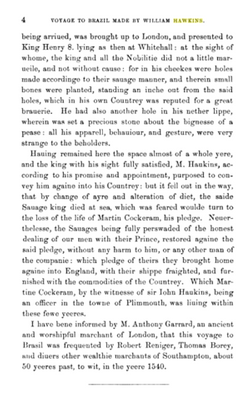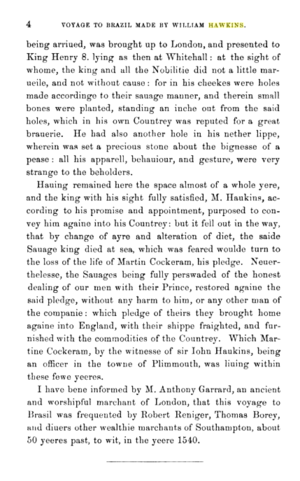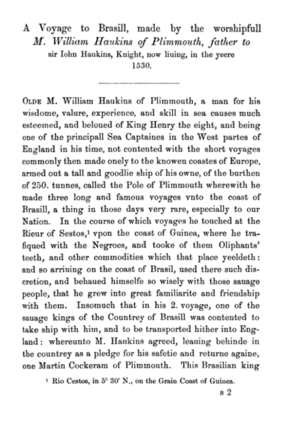William Hawkins was one of the richest men in the town of Plymouth. He had a large fortune and estates, owning lots of property in Plymouth. His name stands fifth on the oldest extent list of Plymouth freeman. He held the office of Receiver of Plymouth, England in 1524-1525.
He was in great favor of King Henry VIII. He was an officer in the Royal Navy, one of the outstanding sea captains of England. He was held in high regard with a just reputation for his skills and experience.
He began his career as a merchant, exporting cloth and tin, and importing salt, wines, sugar. pepper, and olive oil from the various ports in Europe.
During the Reign of Henry VIII, the infamous slave trade was started by William Hawkins. He did not consider the slave trade in the same regard that we do today.
William armed his own ship, called "Paul of Plymouth." It was a tall ship of 200 tons. He wanted to venture further than the short voyages made along the coasts of Europe at that time. He made at least 3 long and famous voyages (The first about 1528, the second 1530, the third 1532.) He sailed to the coast of Guinea where he dealt in slave trading, acquiring elephants' teeth and other cargo. He set out crossing the Atlantic to Brazil to exchange his cargo for other goods that was in demand in Europe. He became friends of the savage people and earned their respect and trust, so on his second voyage to Brazil, in 1530, one of the savage kings that was interested in seeing the wonders of England begged to sail with William when he returned to home. In exchange for the safe keeping of the savage king Hawkins left Martin Cockeram, of Plymouth, behind as a pledge of their King's safe return.
When they arrived in England the Brazilian chief was taken to Whitehall and presented to King Henry VIII. The King and Court had never seen any one that looked so strange. The savage King had bones implanted in holes in his cheeks, they extended out about an inch from the holes. The court was told that this was for great bravery in his own country. He also had another hole in his lower lip that was set with a precious stone about the size of a pea. He was the first savage chief to be brought to England and his apparel, behavior and gesture were very strange.
After spending nearly a year in England, Captain Hawkins was returning with the savage chief to Brazil when he became very ill and died at sea. They all feared that Martin Cockeram would be put to death by the savages, but the savages realized the honest dealing with each other and restored the hostage to their friends. For many years after they returned to England Cockeram lived at Plymouth.
After William Hawkins made his third voyage in 1532, he was chosen Mayor of Plymouth 1532-33. He served as Mayor again in1538-39. That year the King established a Council for the West at Tavistock. In 1539 William Hawkins was elected a member of Parliament.
At this time the church made a radical change. The Reformation was in full swing, and the Roman Church was denounced. Plymouth became strongly Puritan, and the Huguenot were making the port their head-quarters. William Hawkins was overcome with the Reforming Spirit.
There are many records of transactions of William Hawkins that still exist in England. He married his cousin, Joan Trelawny.
Williams two sons, William and John Hawkins became distinguished seamen and naval heroes. They entered the navel service with great advantage, owing to the wealth and experience of their father.
Source: THE HAWKINS FAMILY OF PLYMOUTH
By Geoff Ledden.
It is not known if William died in Plymouth or London.
William Hawkins was one of the richest men in the town of Plymouth. He had a large fortune and estates, owning lots of property in Plymouth. His name stands fifth on the oldest extent list of Plymouth freeman. He held the office of Receiver of Plymouth, England in 1524-1525.
He was in great favor of King Henry VIII. He was an officer in the Royal Navy, one of the outstanding sea captains of England. He was held in high regard with a just reputation for his skills and experience.
He began his career as a merchant, exporting cloth and tin, and importing salt, wines, sugar. pepper, and olive oil from the various ports in Europe.
During the Reign of Henry VIII, the infamous slave trade was started by William Hawkins. He did not consider the slave trade in the same regard that we do today.
William armed his own ship, called "Paul of Plymouth." It was a tall ship of 200 tons. He wanted to venture further than the short voyages made along the coasts of Europe at that time. He made at least 3 long and famous voyages (The first about 1528, the second 1530, the third 1532.) He sailed to the coast of Guinea where he dealt in slave trading, acquiring elephants' teeth and other cargo. He set out crossing the Atlantic to Brazil to exchange his cargo for other goods that was in demand in Europe. He became friends of the savage people and earned their respect and trust, so on his second voyage to Brazil, in 1530, one of the savage kings that was interested in seeing the wonders of England begged to sail with William when he returned to home. In exchange for the safe keeping of the savage king Hawkins left Martin Cockeram, of Plymouth, behind as a pledge of their King's safe return.
When they arrived in England the Brazilian chief was taken to Whitehall and presented to King Henry VIII. The King and Court had never seen any one that looked so strange. The savage King had bones implanted in holes in his cheeks, they extended out about an inch from the holes. The court was told that this was for great bravery in his own country. He also had another hole in his lower lip that was set with a precious stone about the size of a pea. He was the first savage chief to be brought to England and his apparel, behavior and gesture were very strange.
After spending nearly a year in England, Captain Hawkins was returning with the savage chief to Brazil when he became very ill and died at sea. They all feared that Martin Cockeram would be put to death by the savages, but the savages realized the honest dealing with each other and restored the hostage to their friends. For many years after they returned to England Cockeram lived at Plymouth.
After William Hawkins made his third voyage in 1532, he was chosen Mayor of Plymouth 1532-33. He served as Mayor again in1538-39. That year the King established a Council for the West at Tavistock. In 1539 William Hawkins was elected a member of Parliament.
At this time the church made a radical change. The Reformation was in full swing, and the Roman Church was denounced. Plymouth became strongly Puritan, and the Huguenot were making the port their head-quarters. William Hawkins was overcome with the Reforming Spirit.
There are many records of transactions of William Hawkins that still exist in England. He married his cousin, Joan Trelawny.
Williams two sons, William and John Hawkins became distinguished seamen and naval heroes. They entered the navel service with great advantage, owing to the wealth and experience of their father.
Source: THE HAWKINS FAMILY OF PLYMOUTH
By Geoff Ledden.
It is not known if William died in Plymouth or London.




